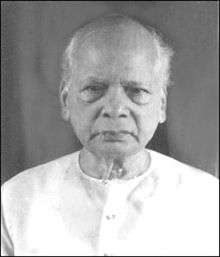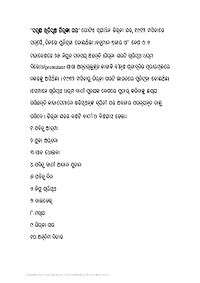Ramakrushna Nanda
| Ramakrushna Nanda | |
|---|---|
 Ramakrushna Nanda during 1990s at Cuttack | |
| Born |
15 February 1906 Bairoi, Cuttack |
| Died |
28 October 1994 (aged 88) Cuttack |
| Occupation | Teacher |
| Language | Odia |
| Nationality | Indian |
| Notable works | Ahe Dayamaya Biswa Bihari |
| Spouse | Saudamini Devi |
Ramakrushna Nanda (15 February 1906 – 28 October 1994) of Bairoi, Cuttack, Odisha, India, was an author of children's literature. He composed the song Ahe Dayamaya Biswa Bihari, a favourite of Mahatma Gandhi at Sabarmati Ashram. This song was included in his Odia-language textbook Sahitya Sopana.[1][2]
Biography
Family
Nanda's father was Madhusudan Nanda (d. 1892). His mother died in 1951. In 1925, Nanda married Soudamini Devi (d. 13 August 1988). They had eight daughters and one son. Nanda's younger brother was Dinakrushna Nanda.[1]
Education

Nanda was educated in the village of Kantapada, and at the Revenshwa collegiate school, Cuttack. He wrote for a school magazine, Chandrika. At the time of Independence of India, Nanda was inspired by a local leader, Gopobandhu and became a Swecha Sebaka, a volunteer. He stayed in Alkasrama,until continuing his studies at Satybadi Jatiya Bidyalaya, where he learnt Devnagiri, a type of Indian alphabet. Nanda also matriculated from the English medium school and later received a bachelor of education.
Career
Nanda began his career as a teacher at Banki school. He was then, for six years, an assistant teacher at Baripada high school. In 1933, Nanda became a social worker. He began a local welfare organization called Narayan Samiti. He was also a head master at Bhingarpur high school.
Writing
Nanda's first textbook in the Odia language was Sahitya Sopana. In 1946, he left his job and came back to Cuttack. On 21 July 1947, Nanda opened Parijata press. In August 1952, he began the Sansar magazine. The press closed in 1961. In retirement, Nanda wrote children's books and songs. Of the form nanabaya, (nonsense rhyme), Nanada said,"
- "Unintelligibility or irrelevance does not reduce the value of nanbaya. The rhythm and style is unique. Sometimes the meanings are unclear or impossible to ascertain. In English, some of these rhymes are called 'nonsense' or meaningless rhymes. By defying the metrical prescriptions and grammatical conventions, the spontaneity of these rhymes endear themselves to children."[3]
Lyricist
Nanda's lyrics for Aahe Dayamaya Bishwa Bihari and Holi Holi Re Holi Ranga Rangeli Nali. were used in the 1978 film, Balidaan .[4]
Bibliography
- 1930 – Tulsidas
- 1931 – Tulsidas Dohabali
- 1933 – Pratidhwani
- 1934 – 37 – Sahitya Sopana
- 1938 – Sahitya Bodha
- 1940 – Rachna Darpana
- 1944 – 45 – Patha Sopana
- 1936–46 – Sangram O Sadhana (Part 1 and Part 2)
- 1948 – Don Quixoti ( Translation )
- 1949 – Bigyanara Kuhuka
- 1962 – Biswa Parichaya (Oriya Bhasa Kosha)
- 1969 – Jibana Taranga.[5]
- 1975 – Jhumuka
- 1977–84 – Chaati Gacha series (Athara Phula, Kodie Phula, Baisi Phula, Teisi Phula, Chabisi Phula, Subarna Seu, Marana Doli, Sagara Kanya)
- 1982 – Oriya Sishu sahitya and sangita Sankalana
- 1982 – Prakurtira Galpapuri
- 1982 – Indradhanu (translation)
- 1983 – Ama Bana Jangala Katha (translation)
- 1983 – Ama Sarira (translation)
- 1984 – Suna Pahacha
- 1984 – Ama Jatiya Pasu, Jatiya Pakhi
- 1985 – Ama Jatiya Pataka O Jatiya Sangita, Jatiya Puspa O Jatiya Pratika
- 1986 – Jibana Rahasya
- 1988 – Ratna Pakhuda (Part 1 and Part 2)
- 1989 – Satra Phula
- 1989 – Adekha Banara Phula
- 1989 – Pachatantra Kahani (Part 1, 2 and 3)
- 1992 – Lekhanira Pathasala
- 1993 – Bhabi Dekhantu
- 1994 – Tuntunira Bahi
- 1994 – Biswa Parichaya (2nd edition)
References
- 1 2 Mishra A. R. "Rare interview with Dinakrushna Nanda." Odissa.com website. Accessed (in English) 31 December 2013.
- ↑ Abraham P. "Furore over prayer song remix."The Telegraph Calcutta, India. 13 September 2009. Accessed (in English) December 2013.
- ↑ Nanda R. (ed.) Odiya shashusangit samkalam. Bhubaneswar, Orissa sahitya akademi, 1981 (3) in, Heyman M. et al "The Tenth Rasa: An Anthology of Indian Nonsense." Penguin Books, India, 2007 xivii. ISBN 0143100866, 9780143100867. Accessed at Google Books 31 December 2013.
- ↑ "Ramakrushna Nanda." Oriya music website (English). Accessed 31 December 2013.
- ↑ Datta A. "Encyclopaedia of Indian Literature: A-Devo." Sahitya Akademi, 1987 ISBN 8126018038, 9788126018031. Accessed at Google Books 31 December 2013.
See also
- "Ahe Dayamaya Biswabihari" A poem by Nanda. Accessed (in Oriya) 31 December 2013.